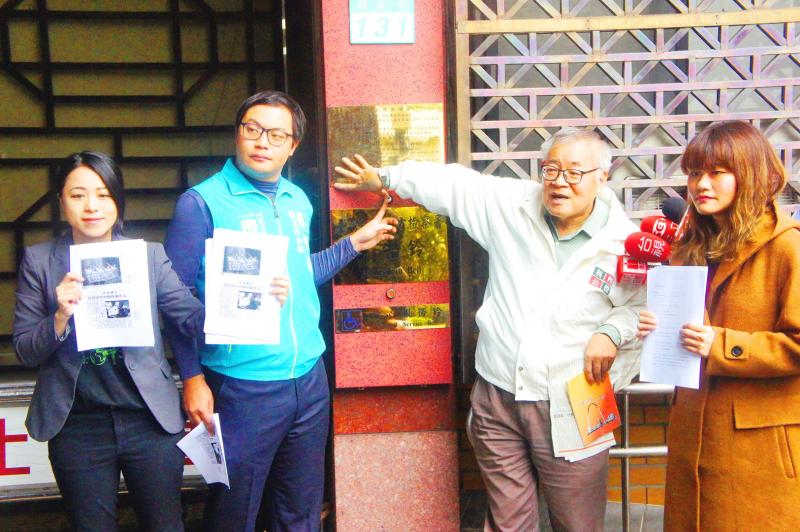China on Wednesday arrested Taiwanese National Party vice chairman Yang Chih-yuan (楊智淵) for alleged involvement in “Taiwan separatist activities.”
Yang traveled to China on Jan. 9, and had not been heard from or seen until he was shown on state media yesterday being escorted by police officers.
Commenting on the arrest, China’s Taiwan Affairs Office spokesman Ma Xiaoguang (馬曉光) told a news conference that “die-hard Taiwanese separatists cannot escape severe punishment under national law.”

Photo: Chien Li-chung, Taipei Times
The Mainland Affairs Council said government agencies had not yet been contacted by Yang’s family to appeal for assistance.
A China Central Television report on the arrest said Yang had been arrested by officers from the Chinese Ministry of State Security in Wenzhou, Zhejiang Province, who said that Yang had “long been engaged in separatist activities aimed at Taiwan’s independence and is suspected of endangering national security.”
The report accused Yang of being involved in the establishment of an “illegal organization,” referring to the Taiwanese National Party, “with the goal of pushing for Taiwan to become a sovereign, independent nation, with the eventual aim of it joining the UN, among other separatist crimes.”
Chinese intelligence agencies had been familiar with Yang for a long time, as he was previously a member of the Taiwan Action Party Alliance — a pro-independence party founded by former president Chen Shui-bian (陳水扁) that dissolved in 2020, a source said.
His arrest was likely meant to pressure Taiwan in the wake of US House of Representatives Speaker Nancy Pelosi’s visit to the country, the source added.
Yang was also involved in the 2008 Wild Strawberries movement and the 2013 “Fury” rally against then-president Ma Ying-jeou (馬英九), the source said, adding that he previously assisted a Chinese dissident seeking asylum in Taiwan.
However, Yang had also been friendly with the pan-blue camp and was even courted by the China Unification Promotion Party to run for it in a local election, the source said.
The Democratic Progressive Party (DPP) yesterday said in a statement that it “strongly condemned China’s lack of respect for human rights and the rule of law, and its use of free Taiwanese citizens as a tool for political blackmail.”
The arrest contravened the terms of the Cross-Strait Joint Crime-Fighting and Judicial Mutual Assistance Agreement (海峽兩岸共同打擊犯罪及司法互助協議), as Chinese authorities did not notify the government or Yang’s family of the arrest, the DPP said, citing a Mainland Affairs Council news release.
Executive Yuan spokesman Lo Ping-cheng (羅秉成) told a news conference that the Ministry of Justice had not been given details about the arrest, adding that the government would follow the case’s development.
Lo said the government urged China to respect personal freedoms including free speech, and to refrain from indiscriminate arrests and abuse of power, which affect the rights and interests of Taiwanese in China.
Additional reporting by Chen Yun and Lee Hsin-fang

The Ministry of Foreign Affairs (MOFA) yesterday said it is closely monitoring developments in Venezuela, and would continue to cooperate with democratic allies and work together for regional and global security, stability, and prosperity. The remarks came after the US on Saturday launched a series of airstrikes in Venezuela and kidnapped Venezuelan President Nicolas Maduro, who was later flown to New York along with his wife. The pair face US charges related to drug trafficking and alleged cooperation with gangs designated as terrorist organizations. Maduro has denied the allegations. The ministry said that it is closely monitoring the political and economic situation

UNRELENTING: China attempted cyberattacks on Taiwan’s critical infrastructure 2.63 million times per day last year, up from 1.23 million in 2023, the NSB said China’s cyberarmy has long engaged in cyberattacks against Taiwan’s critical infrastructure, employing diverse and evolving tactics, the National Security Bureau (NSB) said yesterday, adding that cyberattacks on critical energy infrastructure last year increased 10-fold compared with the previous year. The NSB yesterday released a report titled Analysis on China’s Cyber Threats to Taiwan’s Critical Infrastructure in 2025, outlining the number of cyberattacks, major tactics and hacker groups. Taiwan’s national intelligence community identified a large number of cybersecurity incidents last year, the bureau said in a statement. China’s cyberarmy last year launched an average of 2.63 million intrusion attempts per day targeting Taiwan’s critical

‘SLICING METHOD’: In the event of a blockade, the China Coast Guard would intercept Taiwanese ships while its navy would seek to deter foreign intervention China’s military drills around Taiwan this week signaled potential strategies to cut the nation off from energy supplies and foreign military assistance, a US think tank report said. The Chinese People’s Liberation Army (PLA) conducted what it called “Justice Mission 2025” exercises from Monday to Tuesday in five maritime zones and airspace around Taiwan, calling them a warning to “Taiwanese independence” forces. In a report released on Wednesday, the Institute for the Study of War said the exercises effectively simulated blocking shipping routes to major port cities, including Kaohsiung, Keelung and Hualien. Taiwan would be highly vulnerable under such a blockade, because it

UNDER WAY: The contract for advanced sensor systems would be fulfilled in Florida, and is expected to be completed by June 2031, the Pentagon said Lockheed Martin has been given a contract involving foreign military sales to Taiwan to meet what Washington calls “an urgent operational need” of Taiwan’s air force, the Pentagon said on Wednesday. The contract has a ceiling value of US$328.5 million, with US$157.3 million in foreign military sales funds obligated at the time of award, the Pentagon said in a statement. “This contract provides for the procurement and delivery of 55 Infrared Search and Track Legion Enhanced Sensor Pods, processors, pod containers and processor containers required to meet the urgent operational need of the Taiwan air force,” it said. The contract’s work would be